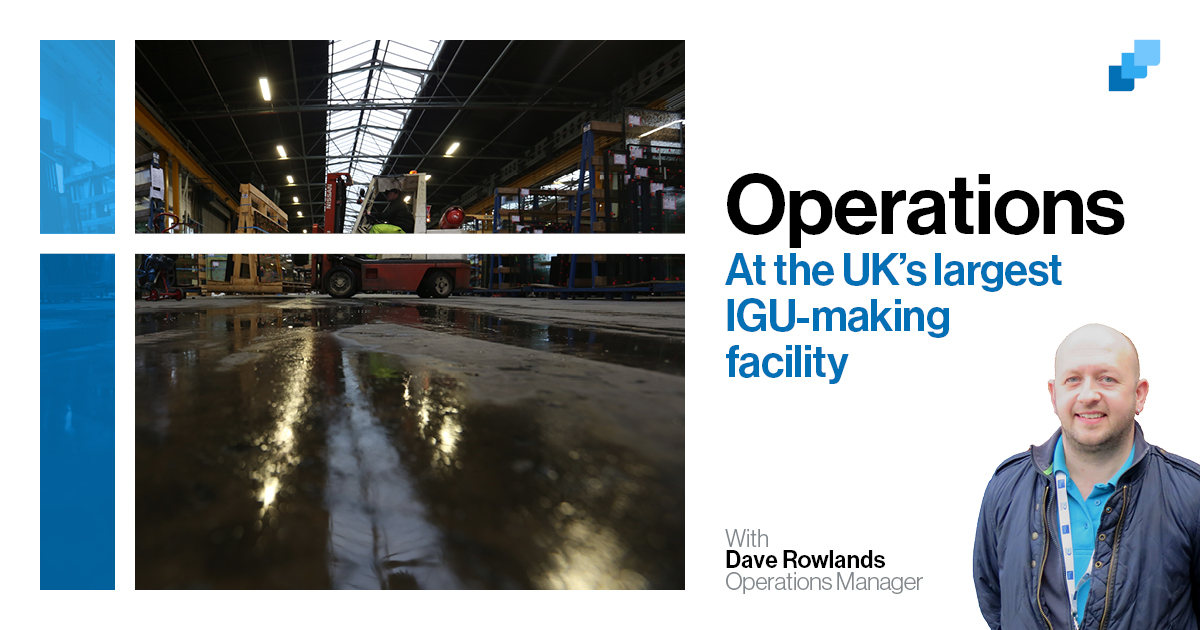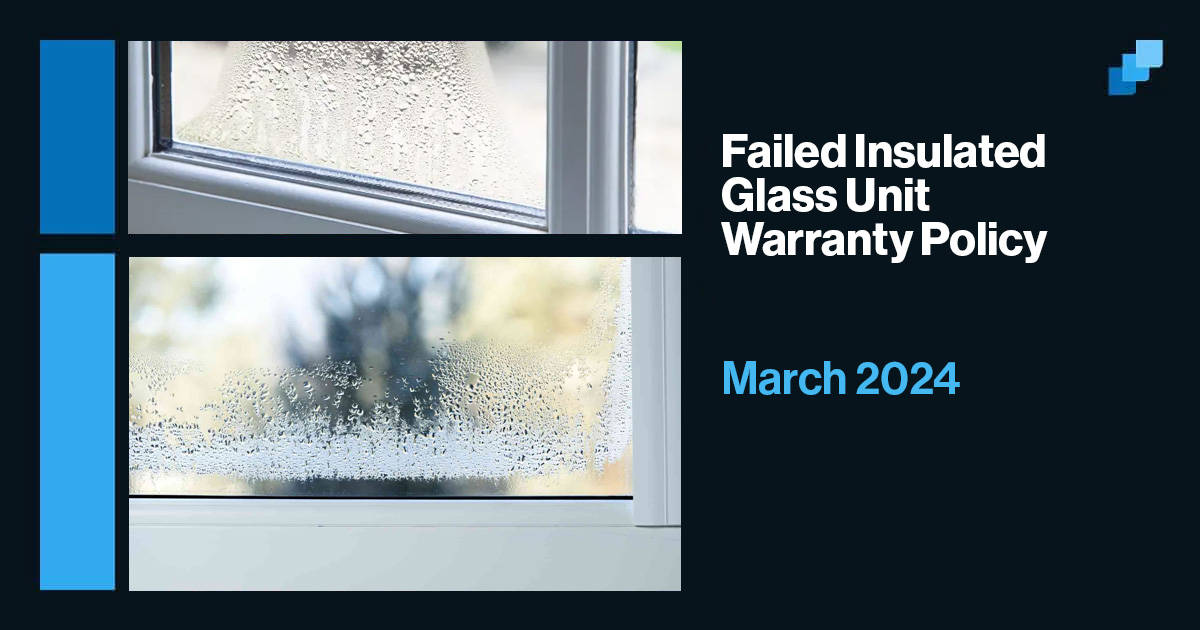Earlier this year, in a period before Covid-19, Clayton Glass were beginning to really see the fruits starting to bare, of a new, long-worked-on operations machine involving our two new glass manufacturing sites in Huthwaite and Blackburn. In February, we sat down with Harelaw’s talented Operations Manager Dave Rowlands. Discussing how he tackles the constant, vital balancing act, that is operations at the UK’s largest glass manufacturing site.
ONLY AS GOOD AS ITS OPERATIONS
Operations, quite simply, are the way a company gets a product or service from point A to point B. Without these plans in place, a business would be doomed to failure. If a company were a human body, with all its various departments, operations would be the beating heart, the focused brain and the busy vascular system – all rolled into one. As Dave Rowlands points out: “Everything that happens between a glass order coming in, to the completed units heading down the motorway on a stillage – all of that is operations.” If making money is the ‘why’ of a company, operations is very much the ‘who’, ‘what’, ‘when’, ‘where’ and ‘how’.
“We’re all immensely proud of the numbers we push out.” Remarks Dave. Referring to Clayton Glass’ industry high ‘On Time, In Full’ percentage of around 99.5%. Coupled with the consistent dispatch of around 5000 glass items per day. “Operations are a massive part of any business.” Dave continues. “that’s no different here at Clayton, you look at the proportion of our staff that actually fall into the operations pool, it’s huge, everyone’s job is linked to operations in some shape or form.”
Dave goes on to explain how he believes a good company should operate. Highlighting the need for processes to be constantly looked at and refined. So as to produce the most efficient system possible. “I think that’s imperative” Dave summarises. “An ambitious company doesn’t stop and stand still when it comes to their operations. They experiment. Constantly tinker. They figure out what works and what doesn’t, to produce a service, over time, that becomes unmatched.”
I remember when I started as a 16-year-old, 24 years ago, feeling that there was a Clayton difference then. Just the way everyone took pride in their work. They wanted to do their best! This was something that was instilled in me by the guys I worked with back then.
Dave Rowlands on the Clayton Difference
“It is in this way, that a business can only ever be as good as its operations.” says Dave. “It falls on the individuals in the operations team to carry out their roles effectively, to ensure that the whole system doesn’t collapse!”. Dave explains that, while there are always contingency plans in place in case something does go wrong, it potentially only takes one mistake to create a domino effect of problems that can ultimately lead to an unhappy customer.
“This is why, at Clayton, the guys on the factory floor deserve so much credit.” states Dave. “Without them performing their individual tasks as well as they do, the whole system would cease to function. I have been working here for a long time. What you see is everyone always trying their best for the goodness of the company. They are the foundation on which our positive reputation is built.”
THE BALANCING ACT
There’s a reason the word ‘bespoke’ is one that is used so frequently in the glass industry today. This is not just in reference to products either, but also to the length of time these products are assembled in. As well as their designated day of delivery, i.e. lead times. Tailored, customised, often personalised units, pass through the Clayton Glass factory floor, every single day. All with a rigorously-thought-out journey ahead of them.
“It’s a customer-driven industry.” Says Dave. “You’ve got to keep it going all the time, this is how it is when you’ve got to work to short lead times. This is simply the way of the industry!”. Dave explains that the non-stop nature of glass operations is what keeps everyone on their toes. As ultimately the goal of this hard work is a happy customer.
Another word familiar to the tongue of glass industry professionals is ‘realistic’. Team spirit, work ethic and a drive to succeed are all easier to cultivate in a factory floor team if goals are attainable. “This is a big part of my job.” says Dave. “Keeping the shop floor team motivated and happy, you don’t want to just keep piling up their workload and hope that it works out. You need to communicate with them, get an idea for what will keep them happy, and fight their corner when the orders are flying in, to do as much for them as you can to make sure their workload is realistic.”

This is the balancing act of operations at the UK’s largest glass manufacturing site. Keeping the customer happy by meeting their requirements, balanced by maintaining a manageable workload for the teams on the floor – this is an aspect of his role that Dave Rowlands embraces, but also admits is the most challenging.
“Keeping everybody happy is a challenge” says Dave, “and while it sounds simple in concept, the reality is that you’ll be dealing with different issues on a daily basis; comments and requirements from the customer, perhaps a bit of push back from the lads on the floor, whether that be to do with quality, location, feasibility etc. you’re at the heart of it and you just have to tick things off one by one.” Like the proverbial experienced tightrope walker, Dave Rowlands maintains balance.
HONESTY, RESPECT & EXPERIENCE
Simply from sitting down to talk to Dave during this interview, it is apparent that there is a clarity to how he communicates, something possibly honed through his years of work on the factory floor, but undoubtedly something that contributes to him being effective in his current role.
Communication is important in many walks of life, but few more so than in a management position, Dave believes that communication at all levels of the business is a key factor in determining how successful a company’s operations are. “You have to be able to communicate effectively with everyone in my role.” Dave explains. “That ranges from office staff, that have been in contact with the customer, to obviously the staff on the floor – relaying these messages effectively can be the difference between success and failure.”
Dave explains that, on top of this, there are two vital elements to communicating effectively. “Firstly, Honesty.” says Dave. “You need to be honest with the customer with regards to what can actually be achieved, false promises help no one, and honest with floor staff on what you need from them. Secondly, decisiveness, once you have made a decision you’ve got to stick to it.”
This leads us onto respect, something no one who manages people can do without. “I’m just myself.” says Dave. “My approach has always been that I’m never false, I think if you are false you get found out pretty quickly.” Dave explains that he will always treat an individual with respect, no matter what level of the business they are at. “I simply speak to people the way I would like to be spoken to, and how I would’ve liked to be spoken to by a manager back when I was on the factory floor.”
You need to communicate with them, get an idea for what will keep them happy, and fight their corner when the orders are flying in, to do as much for them as you can to make sure their workload is realistic.
Dave Rowlands on managing his team effectively
Dave Rowlands has now been with Clayton Glass for over 24 years, starting straight out of school when he was just 16 years old. He believes this education has been hugely beneficial to becoming an effective Operations Manager.
“I’ve learned from others, when I started here, I was so young, but you quickly learn the management styles that you prefer.” Dave explains, “Everyone will have had managers that shouted and balled, showed you no respect, I looked at that and decided that that’d never be how I went about things.” Dave highlights how he manages people by explaining that he always tries to educate, and bring out the best working mentality in people, especially those starting at a young age like he did.
A DIFFERENCE
The Clayton Difference is the well-established mantra of Clayton Glass as a company. It reads that while we are now a large business, with multiple sites and huge capacities, we are first and foremost a family. Providing all the care and attention that comes with it. Dave explains how the Clayton difference is something he has always felt at the company. Even all the way back in the beginning of his journey. “I remember when I started as a 16-year-old, 24 years ago, feeling that there was a Clayton difference then.” Says Dave. “Just the way everyone took pride in their work. They wanted to do their best! This was something that was instilled in me by the guys I worked with back then.”

Dave explains that the Clayton difference is something that he believes has been passed down through generations of Clayton Glass workers and believes he is doing his upmost to impart what he’s learned to the current and future generations. “For me, the Clayton difference is people having a sense of pride and drive. It starts at the top and filters down. There’s a lot of people here with long service, offices, shop floor etc who continue to do that. Simply because that’s what was bred into us.”
CONCLUSION
In conclusion, it is now clear for anyone to see the challenges involved in managing the operations at the UK’s largest glass manufacturing site. From constantly refining your systems to perform as well as you can as a company. To consistently keeping customers happy, and maintaining short lead times. To maintaining a manageable workload for factory floor staff to stop them becoming overwhelmed. All whilst instilling a sense of pride and drive to inspire future generations of workers. These all come together to create the all-important balancing act that is operations.






